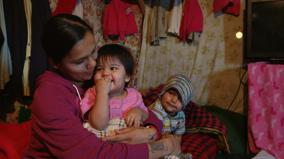 We Can't Make the Same Mistake Twice
We Can't Make the Same Mistake Twice
The rights of First Nations children take centre stage in this monumental documentary. Following a historic court case filed by the Assembly of First Nations and the Child and Family Caring Society of Canada against the federal government, Alanis Obomsawin exposes generations of injustices endured by First Nations children living on reserves and their families. Through passionate testimony and unwavering conviction, frontline childcare workers and experts including Cindy Blackstock take part in a decade-long court battle to ensure these children receive the same level of care as other Canadian children. Their case against Canada is a stark reminder of the …

Details
-
directorAlanis Obomsawin
-
writerAlanis Obomsawin
-
editorAlison Burns
-
cameraRené Sioui LabellePhilippe AmiguetGermán GutiérrezMaarten Kroonenburg
-
location soundGlenn HodginnsThierry Morlass-LurbeMarco FaniaYann ClearyKim Nguyen
-
original musicMichel DubeauLauren Bélec
-
musicianMichel DubeauLauren BélecNormand Guilbeault
-
additional musicDominique Tremblay
-
song - writerRuth Moody
-
original song composerFrankie Dubois
-
narrationAlanis Obomsawin
-
music recordingGeoffrey MitchellLuc Léger
-
voice recordingGeoffrey MitchellLuc Léger
-
sound editorDon Ayer
-
foleyLise Wedlock
-
researchAlanis ObomsawinKatherine Kasirer
-
rights clearancesElizabeth Klinck
-
on-lineDenis Pilon
-
graphic designMélanie BouchardJacques-Bertrand Simard
-
titlesMélanie BouchardJacques-Bertrand Simard
-
digital editing technicianPierre DupontIsabelle PainchaudPatrick Trahan
-
animationÉlise SimardBrigitte Archambault
-
technical coordinatorJean-François LapriseDaniel Lord
-
technical coordination, projectsSteve Hallé
-
technical coordinator - shooting equipmentSteve Hallé
-
marketing managerFrançois Jacques
-
marketing coordinatorJolène Lessard
-
publicistPat Dillon
-
legal counselDominique Aubry
-
production assistantMylène AugustinJohn Leo Woolsey
-
production coordinatorChristine Williams
-
senior production coordinatorCamila BlosIsabelle Limoges
-
program administratorLeslie Anne Poyntz
-
producerAlanis Obomsawin
-
executive producerAnnette Clarke
Education
This documentary examines a historic court battle for the rights of First Nations children, through a case filed by the Assembly of First Nations and Child Caring Society of Canada against the federal government. Deeper understanding, research, discussions and projects related to children and human rights, discrimination, systemic racism and barriers, over-representation of First Nations children in foster care, and historical and current child welfare systems. Students could develop further knowledge of the justice system and how it affects First Nations, past and present. Students can learn more in depth about Jordan’s Principle and the key advocates who fought tirelessly for the human treatment of First Nations children. What is the connection between the forced assimilation policies of residential schools, the Sixties Scoop, child welfare and the foster care system? Research the impacts of colonization tactics such as the reserve system and forced relocation. What are examples of traditional child-rearing practices? What are some of the lasting, devastating effects of government policies on First Nations family structures and what are examples of traditional kinship and community practices? What is Jordan’s Principle and how does it protect First Nations children?

















